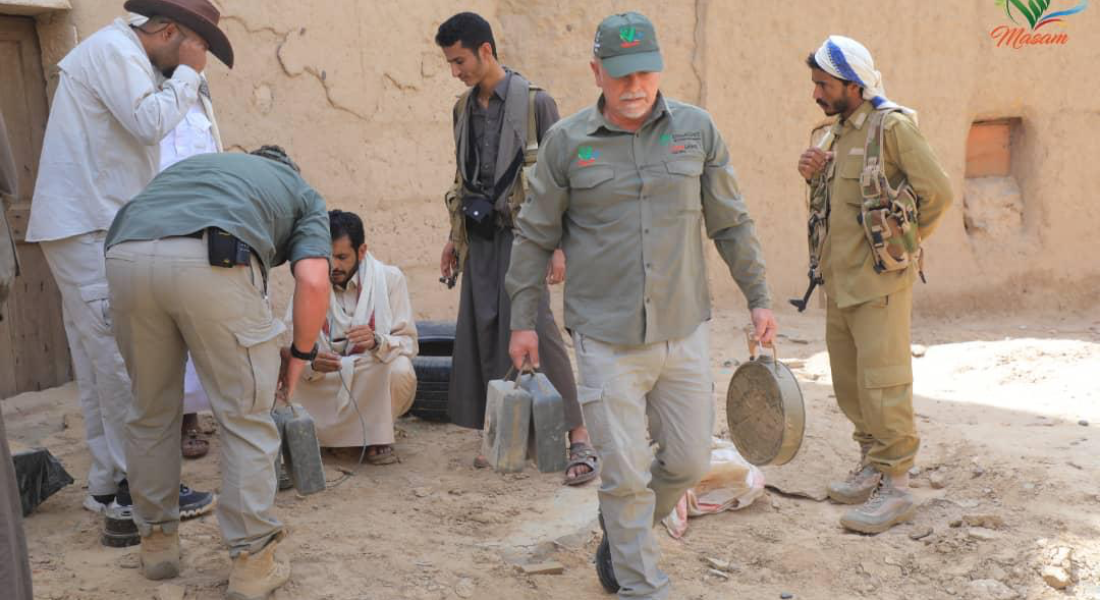
Last week, two Masam teams were separately contacted by locals, who asked if they could hand in landmines that they had found in their villages in Yemen’s central Provinces of Marib and Shabwah, respectively.
Both provinces have been central frontlines in the conflict between Houthi militias and pro-government forces and have been littered with landmines and other remnants of war.
During the week ending 29 October 2021, a local national in Osilan, northwest of Shabwah and another villager in Rahbah, close to the Marib frontline, contacted Masam’s Team 10 and Team 12 to request their help. The villagers had both found anti-tank mines, and had taken them home.
Team 10 was handed four anti-tank mines, and Team 12 discovered eight anti-tank mines had been brought into the other villager’s house.
Whilst this is not an isolated incident in Yemen’s liberated areas, it certainly is a potentially tragic one. Anti-tank mines produce either a mobility kill or a catastrophic kill and typically have a much larger explosive charge than anti-personnel mines.
“Most of the mines are from previous Houthi occupation. They were then removed by the locals once the Houthi have been pushed out from that area. Most mines removed by locals are to open up road ways and farm land to enable farmers to grow crops and provide for themselves and the community,” Project Masam’s Operations Manager Retief Horn said from Masam’s headquarters.
“Most locals keep the mines at home so we always instruct the survey teams to ask if they villagers have mines, and if they are willing to hand them over to us.”
A dangerous war chest
The reason for this hoarding? Landmines are a currency.
On countless occasions, Project Masam teams have unfortunately witnessed civilians stockpiling landmines and other explosive devices in their homes as a booty of war.
Amid the humanitarian crisis, landmines, which can be re-used or re-purposed, can be sold on so-called “weapons markets”. In Marib’s gun market, a landmine sells for an average YER 5,000 — the equivalent of GBP 14.6, or USD 19.9, Masam has found.
“The problem with this is that 99% of the time the civilians want us to pay to “buy” the mines from them, but we are not allowed to do that, as this would then encourage the locals to go into unsafe areas to then remove mines to sell to us,” Horn explained.
Instead, Masam has adapted the policy of “food for mines” as instructed by Ousama Algosaibi, Managing Director and Programme Manager, whereby Masam offers foodstuff and seeds to civilians in exchange for their arsenal.
Deliberate handling
“On the occasion that the mines are reported and handed over, the locals are scared to be caught with the mines in their possession — by the wrong people — and then punished for that or that the mines will be used against the community a second time,” Horn said.
Once they are contacted to retrieve the explosive item or items, the team then gathers all possible information on where the landmine, or landmines were found, by conducting a Non-Technical Survey (NTS). On completion, the team then conducts a Technical Survey to confirm the area is free from mines.
Recalling another incident that took place last year, Horn said: “In May of 2020, we had a call from a local to the Masam Operations Room, reporting that he had landmines in his “compound” that he wanted removed, and asked if we could assist with this.
“A colleague and myself went to the locals house and removed 16 mines that were stored there for more than 10 years. All the PRB-M3 (plastic cased minimum metal anti-tank blast mines) had never been used and were still “brand new” 30 years later.”
Mines have been laid across Yemen over the course of four main violent conflicts in 1962–1975, 1963–1967, 1970–1983 and 1994, and since the recent conflict erupted in 2014.
Mine Risk Education
While Project Masam works with local authorities to implement an order under which landmines found in homes and gun markets would be immediately confiscated and destroyed, the issue of civilians’ landmine stockpiling is still alarming.
Across nine governorates, Project Masam continues to carry out an efficient awareness system among the population for the detection of anti-personnel and anti-tank mines, as well as unexploded ordnance (UXO), including through a Public Awareness Poster Campaign, addressing several critical issues and sharing the following messages targeted to the local population:
Avoid touching any foreign object you might find in your farm, house or path/road.
Report any foreign object or concern to Project Masam immediately.
Do not store explosive devices in your home.
During the last week alone, Masam teams found and cleared 1,759 explosive items across those nine governorates, including 569 anti-tank mines, and 11 anti-personnel mines.
This article was first published on Medium.

